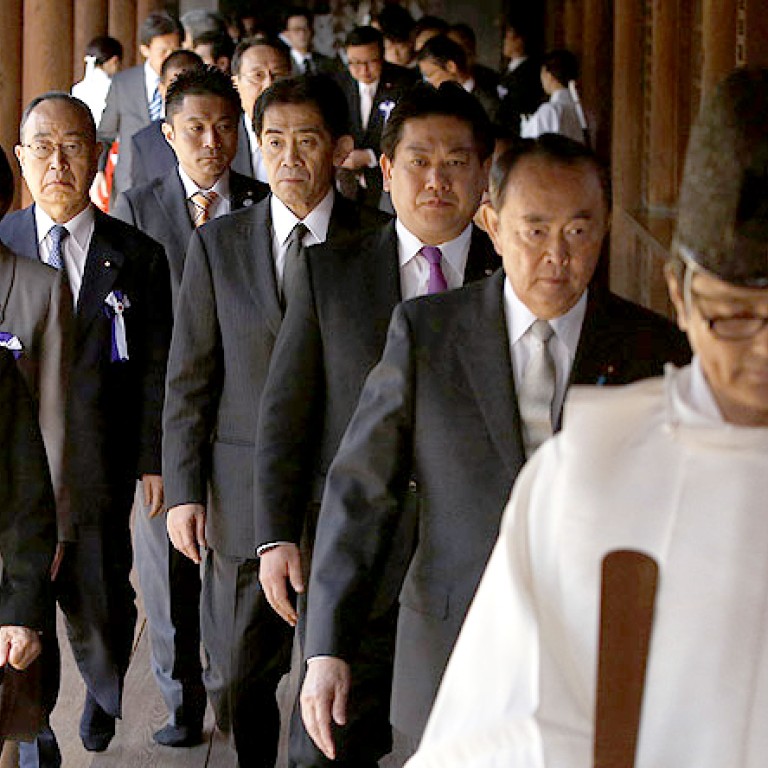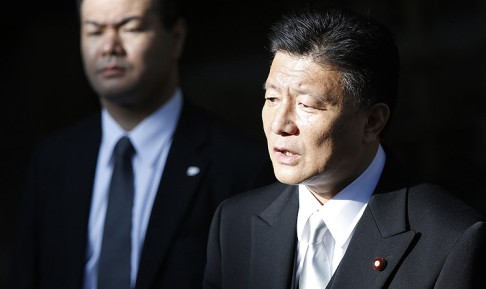
150 Japanese lawmakers visit controversial Yasukuni Shrine, straining regional tensions
A Japanese cabinet minister and some 150 lawmakers visited the Yasukuni Shrine in Tokyo on Tuesday, in a move that could further strain ties with China, which seized a ship owned by Japanese shipping firm on Sunday
A Japanese cabinet minister and some 150 lawmakers on Tuesday visited Yasukuni Shrine, which is seen by critics as a symbol of Japan’s past militarism, in a move that could further strain fraught regional ties.
Prime Minister Shinzo Abe sent an offering to the shrine on Monday, just days before a visit to Tokyo by US President Barack Obama, provoking an angry response from China and South Korea, which decried it as romanticising Japan’s wartime past.
Internal Affairs minister Yoshitaka Shindo, along with a close aide to Abe, paid their respects at Yasukuni, where 14 war criminals convicted by an Allied tribunal are honoured along with the nation’s war dead, as part of the shrine’s annual spring festival that ends on Wednesday, the day Obama arrives.
Watch: Nearly 150 Japanese lawmakers visit controversial war shrine
“The government should not interfere with a shrine visit made by an individual ... This is the fundamental thinking of the Abe government”
“As this visit was my personal visit, I don’t believe that it will have any effect on the US President’s visit,” Shindo told reporters. A separate visit Shindo made to Yasukuni earlier this month prompted an angry response from China.
Abe made a December visit to the shrine as part of a delicate dance aimed at pleasing his conservative supporters while trying to minimise international criticism. But the visit sparked widespread global anger, with key ally the United States saying it was “disappointed”.
Seiichi Eto, a special aide to Abe, told reporters that his visit and those of the lawmakers “should have nothing to do” with Obama’s visit.
“The government should not interfere with a shrine visit made by an individual, since that would infringe on their freedom of belief,” chief cabinet secretary Yoshihide Suga told a news conference on Tuesday.

“This is the fundamental thinking of the Abe government.”
Adding to unease in the region, a Chinese maritime court in Shanghai at the weekend seized a ship owned by Japanese shipping firm Mitsui OSK Lines, a move that Japan warned could have an adverse impact on its businesses in China.
Suga described the seizure, part of a wartime compensation lawsuit, as regrettable. “The case may shake the spirit of the 1972 joint declaration made when Japan and China normalised diplomatic relations," he said.
The court said the company had failed to pay compensation stemming from a wartime contractual obligation. China’s Foreign Ministry spokesman Qin Gang said the disagreement was an “ordinary commercial dispute”.
“The case has nothing to do with post-war compensation,” he said on Monday. “China's position in upholding the principle of the Sino-Japanese declaration has not changed.”
Japan said the ship seizure, apparently the first time the assets of a Japanese company have been seized in a lawsuit concerning compensation for the second world war, was “extremely regrettable”.
